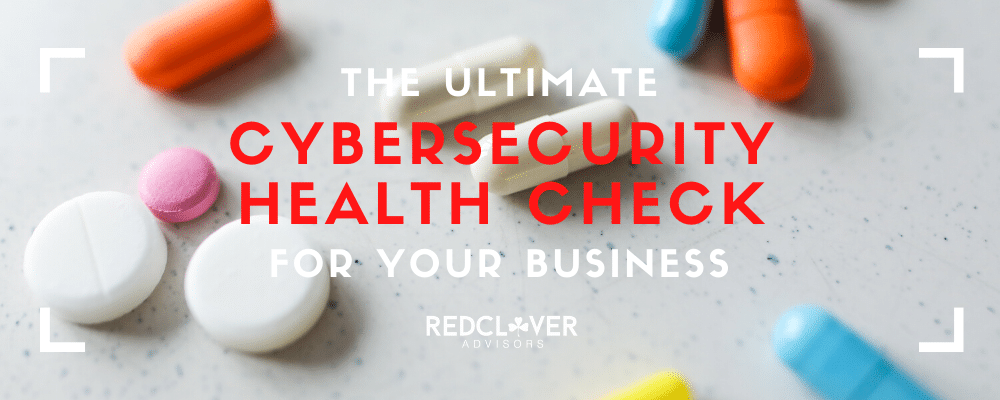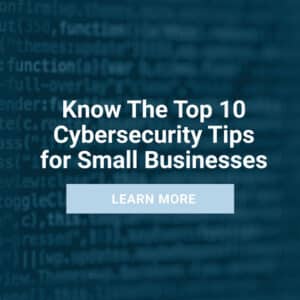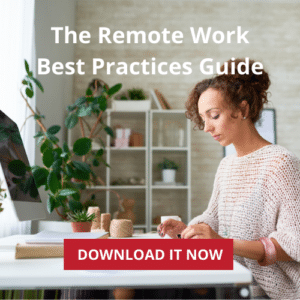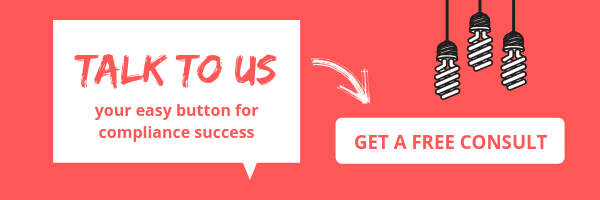It’s well known food, exercise, mental health, and lowering stress are all things people can do specifically to prevent many diseases. By investing in higher quality foods and investing time in our bodies, we can prevent a medical disaster.
Yet less than 5% of adults participate in 30 minutes of physical activity every day. It seems most people know what’s best for them… but don’t make the time for it.
The same is true with data breaches.
77% of businesses don’t have a cybersecurity plan. And just as with staying healthy, if you’ve done nothing to prepare, you’re left vulnerable. If you do a little to prepare, you’ll lower the risk a tad. And if you do it once and forget, it’s like saying the diet you did 30 years ago should be giving you results today.
While you don’t need to do push ups to keep your company safe from online hackers, you do need to implement a steady diet of security measures to protect your customers and your business.
That’s why we’re giving you The Ultimate Cyber Security Health Check. It includes all the preventative measures your business can take to keep your privacy management healthy. Check it out.
Have a Plan: Preparing for Phishing Scams
When dieting, it’s important to set yourself up for success or you’ll inevitably fail. That’s why many people meal prep. They know if the food is already prepared, they won’t be tempted to cheat.
When it comes to your business’s privacy, you also need to be prepared. If you don’t, the consequences are much more severe than that of sneaking a cookie or other sweet treat.
Phishing attacks are the leading cause of data breaches, accounting for 90% of them. These are attempts to trick users in your organization into clicking a malicious link or providing sensitive information. And while there isn’t a way to 100% prevent your company from experiencing a phishing attack, there are many measures you can take to protect your business.
1. Train your Employees
Provide your employees with ongoing security awareness training programs and conduct simulated tests to measure results. This will teach your team to spot phishing emails and avoid making a business-ending mistake.
But just like dieting or working out, if you do it once, you won’t see the results you want. In 2018, companies that ran 11 or more training campaigns about phishing awareness reduced click-through rates to 13%. So keep in mind the importance of consistent training as opposed to a one-time session.
We recommend Curricula for this training. It’s the best in the business, and if you mention Red Clover Advisors sent you, you’ll get the red carpet treatment.
2. Implement Security Software
Think of security software as your daily vitamin. Like vitamins, security software keeps out the bad stuff. And it’s a highly effective way of preventing phishing emails and the security issues common to Zoom right now. Security software will allow your business to implement an email filter that can block 99.9% of spam and phishing emails and 100% of known malware.
There are several security defenses your business should invest in:
Firewalls
Firewalls set up barriers between your internal network and outside networks such as the internet. They use defined rules to allow or block traffic. Firewalls can be hardware, software or both.
Virtual Private Networks (VPN)
A virtual private network allows you to create a secure connection to another network over the internet. This is especially important if you have employees handling data on their own computers or phones.
Data Loss Prevention (DLP)
A DPL can identify, classify and tag sensitive data and monitor the activities and events surrounding that data. This is a great way to ensure your employees don’t send any sensitive information outside the business’s network.
Network Segmentation
Network segmentation divides a network into multiple segments or subnets, each acting as its own small network. This allows network administrators to stop harmful traffic from reaching devices that are unable to protect themselves from attack.
Antivirus Software
Antivirus software is one of the most common security softwares for a business to invest in. They prevent, detect and remove malware from computers.
3. Put Limits on Access Controls
Your doctor doesn’t just share your health records with just anyone. And you shouldn’t share your clients’ personal data with everyone either.
95% of cybersecurity breaches are caused by human error. And hackers know this. That’s why most phishing attack methods target privileged user accounts. To protect the personal data your company processes, limit its access to only the employees who need it to complete their jobs.
For more online preparedness steps and tips, download the free Remote Work Guide. It’s designed to help companies of all sizes understand best practices for security, privacy and operations when it comes to remote work.
Make the Investment
When trying to implement a healthier lifestyle, there are bound to be upfront costs. From workout clothes and gym memberships to organic foods and nutrition plans, you’re going to have to make the financial investment somewhere.
If you don’t take preventative measures to ensure your health stays intact, you may eventually suffer a catastrophic medical episode. The same goes for protecting your data. If you don’t take precautions to ensure the health and protection of your data, a data breach is likely. And this can cost you in money ($200 per record), time (losing focus on core business activities), and longevity. Some data breaches even lead to class action lawsuits under laws like the CCPA, which sucks up even more of your valuable resources.
Those resources instead could be used to grow a company and focus on sustaining it.
Just as you consult with doctors, personal trainers, and nutritionists – and a myriad of health tools and systems – to help you, your business needs dedicated internal and external personnel to handle your privacy.
Here are a few investments your business should make in security:
1. Hire a Fractional Privacy Officer
There’s rapid adoption of global privacy laws taking place across the world. And the security team can’t prevent and react to data breaches all on their own. The role of a Chief Privacy Officer has never been more important. But that’s not a cheap position to staff. And if you’re like most small-to-mid-market businesses, you can’t afford to fill a full-time position.
That’s why an increasing number of companies are outsourcing this role to privacy consultants or Fractional Privacy Officers.
Smart companies realize privacy best practices and a privacy program influence and have a big role in the prevention of a data breach. An FPO steps into this role as a preventative force, while saving companies from having to allocate resources to a full-time position.
The FPO is responsible for all your businesses privacy needs including:
- Interpreting & monitoring privacy laws and industry updates to maintain compliance
- Connecting and building a privacy program
- Listening to maintain, report and assess potential risks
But your FPO will only be as good as the tools they have to work with. So make sure your business is fully stacked and prepared before bringing this person on board.
2. The Technology Stack
As mentioned, your FPO won’t be able to do much without the proper resources. It’s important this person has complete visibility into your data. To get started, load up on technologies such as:
Privacy Management Software
This software will enable your business to store sensitive data in compliance with global privacy laws such as GDPR and CCPA.
Third-Party Risk Management Software
The more people touching your data, the more at risk you are for a breach. A third-party risk software will gather vendor risk data to protect your business from risk of data breaches or non compliance.
Consent & Preference Software
This will enable your company to drive opt-in demand while demonstrating compliance with hundreds of global privacy regulations.
Regulatory Research Software
This software will help your FPO stay up-to-date on all the global privacy regulations and make quick adjustments to your privacy management when necessary.
This might look like a lot of different softwares. But don’t let it intimidate you: There are one-stop-shops out there that have all of this included.
In addition, it’s important to keep in mind FPOs will need to work with the security team to integrate and implement any of these tools. The security team is on the frontlines protecting data with a variety of specific cybersecurity tools, and the FPO needs to work with them.
Conclusion: Make Healthier Privacy Choices
Living a healthy lifestyle doesn’t happen overnight. It’s a series of healthier decisions that ultimately become life changing habits.
The same goes for your privacy program. From hiring the right people, working with the right vendors and investing in the best technologies, it’s a marathon not a sprint. But with each step, your business will become more compliant with global regulations and less vulnerable to a data breach.
If you’re ready to build a privacy program for your business, but aren’t sure where to get started, reach out today!




